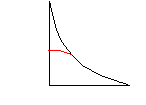



10/29/00
R. Seto
What is a color glass condensate?
A layman’s view
A layman’s view
ngluons ~ x-d ,i.e. there are more of
them as you go to lower x
nviolates unitarity
nIdea (many theorists) : Gluons saturate,
and the distribution stops growing.
nRecently, a new way to look at this phenomena (McLerran,
Venogopolan etc) Idea: at low x there are
so many gluons, that the quantum occupation numbers gets so large that the situation looks classical.
nCan use renormalization group methods to do a
calculation of this effect. Depends only
on a “scale”
LCGC2 = (1/oR2)(dNgluon/dy) ~ 2-D gluon density
nGluons are bosons (interacting) – a bose
condensate!
nGluons fill up the available states, so putting more
gluons in means they have to go into a
higher energy state – higher pt
nHigher pt -> smaller transverse size
nProbes of a particular Q2 go blind to
these small partons. Fixes up unitarity for a fixed Q2.

xG(x)
x
